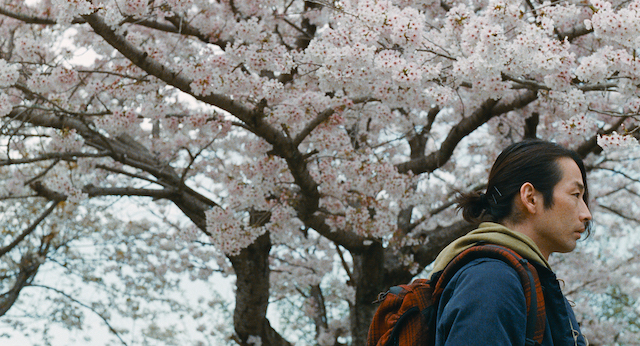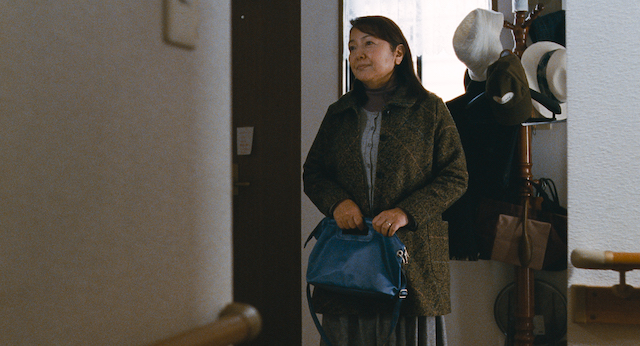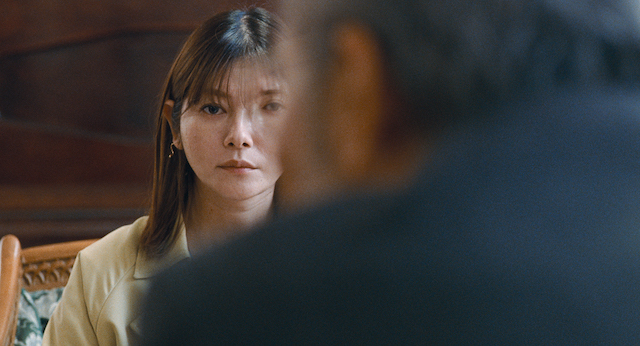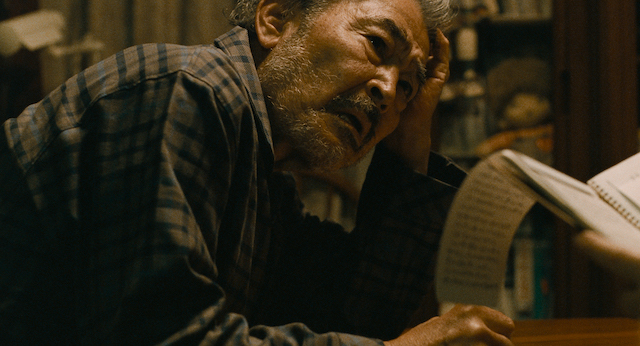
©Courtesy of Japan Cuts
Great Absence : A father and son who’ve been estranged for a long time finally reconcile among lost memories and dispersed pieces of lives.
Director : Kei Chika-ura
Producer : Kei Chika-ura, Miho Horiike
Screenwriter : Kei Chika-ura, Keita, Kumano
Distributor : Gaga
Production Co : CREATPS
Genre : Drama
Original Language : Japanese
Release Date (Theaters) : Jul 19, 2024, Limited
Runtime : 2h 13m

©Nobuhiro Hosoki
Interview with Actor Tatsuya Fuji
Q: Mr. Fuji, you will receive the Lifetime Achievement Award(at Japan Cuts 2024). First of all, could you tell us how you feel about it?
Tatsuya Fuji: Well, a lifetime achievement award? Just being here is something I find amazing. I honestly don’t know if I truly deserve such an award. I don’t think it’s a natural thing for me to comment on it. I felt a sense of joy when I received it, naturally. In my later years as an actor, I received this award for a fantastic film (Great Absence), which was probably one of the two or three most important films of my 62-year career.
An actor really can’t do anything on his own, so I was allowed to do a good job only when there was a script and in a well-organized vessel(crews), so I was mixed with a great (team), for example, being here with director Chika-ura san and receiving praise at the San Sebastian (Film Festival). it was a very happy result.
Q: You have been working with Director Chika-ura for a third time. What is Director Chika-ura’s appeal to you that makes you want to accept his offer repeatedly? We would appreciate it if you could explain the reason behind accepting the offer to star in The Great Absence.
Tatsuya Fuji: First of all, just because I was once used by a director in his film, I don’t think it’s natural for me to accept it the next time I get an offer. If I am not satisfied with that offer. I would rather be open about it and I will turn it down. But in the case of Mr. Chika-ura, each of his three films is, after all, something new, and he is also thinking about promotion and challenging the overseas market. I think it is wonderful that you are able to do all these things on your own.
For someone like me who can only act, I think that Mr. Chika-ura is a person of the new generation, so much so that I thought that Shohei Otani was here too in the film industry. I respect him. And he also loves me as an actor, so I feel that. And of course, I work with Mr. Chika-ura.
Q: Your performance in this film involved playing a person with dementia, a disease that is of great concern to many. Also, there are many moments when I think that age in the U.S. does not really matter, but I would like to ask Tatsuya Fuji, who has been active as an actor in the Japanese film industry, about your passion, or what it means to act. Could you share your opinion?
Tatsuya Fuji: The first one was dementia. About dementia, there was a movie called Sakura Saku four or five years before I took this job, in which I played the role of a person with dementia, although the symptoms were slightly different. My understanding of dementia was solid after listening to various people and reading books. I had a good idea of what I should do. Therefore, I did not have to do any further research on dementia for this production, so I did not have any problems with it.
Also, my job is to play a role, and the ideal form of my job is to hijack myself into that role. I really, really wish that, first of all. I think it would be good if I could disappear. I devise various ways to achieve that.
I do a lot of things to achieve this, such as profiling, visiting the city where the person lives, and so on. In this case, I don’t know what it was, but once I read the script, I was able to input it right away. I was hijacked by that role. Therefore, I did not study anything. So it is strange that the work I do is surprisingly easy and the results are good. I often get no recognition for the hard work I put in. The next reason why I can keep working [is because] I am not bored with this job. If I got bored, I wouldn’t be able to eat every day even if it’s good. Food tastes good because you are hungry.
After all, in my work, I’m hungry, that’s why it tastes good. If I was doing it 24/7, there would be no hijacking (of roles). The sad thing is that my work is inversely proportional to my income. But I like my work as an actor, so I work less so I don’t get bored. That is probably the reason why I have lasted so long.

©Courtesy of Japan Cuts
Q: This time, the character has a very strong personality. The setting is that you have been divorced for more than 20 years, and you also suffer from dementia. What was your impression when you read the script and how did you prepare for the role?
Tatsuya Fuji: Let me start with my thoughts upon reading the script. It seemed to me that the script was free from greed. When composing a script, it is important to include devices that can make people laugh or cry. However, I did not observe any such device in Mr. Chika-ura’s script for Great Absence.This movie is like a documentary where families have no choice but to seek out different situations and witness their sadness. I thought it was a straightforward script without any tricks. I really couldn’t imagine how [people] would react to this film. And when I watched the finished film, I realized how I didn’t have the ability to read the scenario.
I could not imagine such a thing, but I was surprised, moved, cried, and laughed when I saw the movie. I thought the movie was engaging. Mr. Komano, who co-wrote the script with Mr. Chika-ura, said, “From the time I was writing the script, I thought it would have a wonderful interaction with the audience.”
Q: Congratulations on this Lifetime Achievement Award. You mentioned that it is lovely to receive an award overseas. Do you have any thoughts about receiving this award for your work in New York?
Tastuya Fuji: Being praised in New York for a film I took part in is a bit emotional for me. As a filmmaker, this is my second trip to New York, and I had the opportunity to attend the New York Film Festival for the first time with my film In the Realm of the Senses. The fact that we were going to be screened at Lincoln Center in New York was fantastic!
So, we went to Lincoln Center. However, to our great regret, the film was not shown [due to its graphic sexual depictions]. That is because it did not pass the New York State censors. When I returned to Tokyo from New York, I was disappointed. I felt like I was also a sinner for participating in the film because it was caught by the censors.
And now 50 years have passed. I’m in New York, and they will screen the film In the Realms of Senses at Metrograph. I am deeply moved that I am able to screen that film 50 years later. I would like to say, “Thank you, film!”

©Courtesy of Japan Cuts
Q: You worked with actor Mirai Moriyama, who is not only an actor but also a Butoh dancer, and I personally thought he was a very absorbing actor. Taku (played by Mr. Moriyama) and Yoji (played by Mr. Fuji) have a difficult exchange of tactics due to the difference in the nuances of language. How did you and Moriyama discuss this before shooting the film?
Tatsuya Fuji: Perhaps this will be a surprising answer. I don’t have any discussions with the other actors and the director on the set I’m working on, regarding the film. I believe in the words (of the script). The moment you put those subtle human emotions and emotional swings into words, the real thing escapes you.
So, I have not had any conversations with Mr. Moriyama either. Interestingly, just seeing each other with Mr. Moriyama at the moment the kachinko [clapperboard] rings, there are various interactions. Things become very, very uplifting. And then he speaks something, and I feel a lot of things about it, and at the same time I know if this [actor-actor] coupling is going to work.
It’s intriguing that professionals are aware of how Moriyama-san will play this role and how he will collaborate with me. The interesting thing about this role is that I know how Mr. Moriyama is going to play it and how he is going to couple it with me. It is said that professional Shogi players can read 50 or 60 moves ahead—we amateurs cannot believe it, can we? The same thing happens in the case of actors. Therefore, we did not have any meetings beforehand. But the film is still a wonderful entertainment, probably thanks to Mr. Moriyama, who is a wonderful actor.
Q: Earlier, you mentioned New York. After all, Director Oshima came to New York with the film from Los Angeles, not from Paris to New York, and it was confiscated the day after the preview screening was held due to the censorship. I think Mr. Oshima is here [watching over him from heaven] at this venue now as well. Could you tell us what kind of impact that film In the Realm of the Senses had on you, Mr. Fuji?
Tastuya Fuji: If I were to list the most important jobs I’ve done in my career, I would give you two. One is the film In the Realm of the Senses. The other is The Great Absence. These are the two I would mention. That’s how important In the Realm of the Senses has become for me.
In particular, that was a very controversial film. I went to the Tokyo Metropolitan Police Department, where I was questioned. And I was labeled—in a good way and in a bad way. But from the moment it became meaningful to me, it became a springboard. It was such an important job for me. [Though] it wasn’t screened, the actor in the movie One Flew Over the Cuckoo’s Nest, Jack Nicholson, [offered] me his congratulation. In that year One Flew Over the Cuckoo’s Nest and In the Realm of the Senses were among the top three best films in the Kinema Junpo [prominent film magazine in Japan].

©Courtesy of Japan Cuts
If you like the interview, share your thoughts below!
Check out more of Nobuhiro’s articles.
Here’s the trailer of the film.

